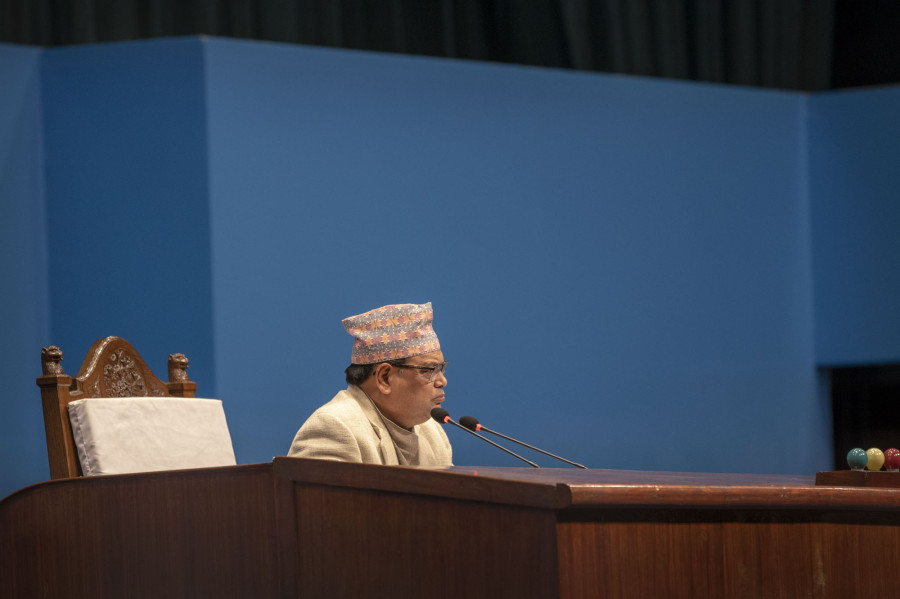National
With Mahara’s resignation, a tricky political situation arises
The House Speaker’s resignation over rape allegations means that the parties will now need to select a new Speaker, a critical position in a parliamentary system.
Anil Giri
Krishna Bahadur Mahara’s resignation as House Speaker following rape allegations has created a tricky constitutional and political conundrum for the country’s parliamentary system.
Mahara stepped down on Tuesday after a woman who works at the Parliament Secretariat accused him of raping her at her Tinkune apartment on Sunday. With the House Speaker’s post now vacant, the parties need to follow the constitutional provision of electing a Speaker and a deputy Speaker from different parties, something the primary opposition Nepali Congress has long been demanding.
Though the Congress has not yet begun an internal discussion over laying claim to the post of Speaker or deputy Speaker, the party will opt for “silent diplomacy” while bargaining with the ruling party for the post of deputy Speaker.
“It is not certain if we will get the post of deputy Speaker because the ruling party has other alternatives,” a senior Congress leader told the Post on condition of anonymity. “So we have decided not to make any noise now.”
The ruling Nepal Communist Party (NCP), which has faced a setback in the wake of rape allegations against one of its key leaders, has also yet to start discussions on choosing the next Speaker of the House of Representatives.
Party leaders said there is no hurry at this point in time as Parliament is currently in recess. Discussions are likely to begin only after the festive season.
Subas Nembang, deputy parliamentary party leader of the ruling communist party, who could be the frontrunner for Speaker, said the party will naturally lay claim to the post.
“The party has not started discussions on the matter in particular, but it’s natural for us to have our party leader in the post of Speaker,” Nembang, who served as chairman of the Constituent Assembly for two terms, told the Post. “We will figure out how to split the post of Speaker and deputy Speaker when the time comes.”
The post of Speaker is considered critical in the parliamentary system as the Speaker holds the power and authority to support and pressure the government as well as the opposition parties. To ensure that the Speaker acts in accordance with parliamentary checks and balances, Article 91 (2) of the Constitution of Nepal envisions splitting the posts of Speaker and the deputy Speaker between different parties with one of the posts going to a woman.
But given the comfortable majority that the Nepal Communist Party currently exercises in Parliament, this could change, say analysts.
“The ruling party may opt for an amendment to Article 91 (2) to allow both posts to go to the same party because it has a two-thirds majority,” said Purnaman Shakya, a constitutional analyst. “The reason behind splitting the posts of Speaker and deputy Speaker from two different political parties is to ensure checks and balances.”
If the ruling party decides to go this route, it would be wrong, both politically and morally, say analysts.
Before Tuesday’s events, both Speaker Mahara and Deputy Speaker Shiva Maya Tumbahangphe were from the ruling Nepal Communist Party. That situation arose coincidentally, as at the time of their election, they represented different parties—the CPN-UML and the CPN (Maoist Centre). The two parties then merged last year to become the Nepal Communist Party (NCP).
As the political situation has changed since Mahara’s resignation, the ruling party should now abide by constitutional provisions, instead of attempting an amendment, say experts.
Even though the Congress party may demand the post of deputy Speaker, it is unlikely to get it, given the command the ruling party holds in Parliament. Leaders say that the post of deputy Speaker could go to any of the two Madhes-based parties—Samajbadi Party Nepal or Rastriya Janata Party Nepal. Since the Samajbadi Party is part of the government, the ruling party may offer the post to the Rastriya Janata Party to woo it, say party leaders.
Both Madhes-based parties have long been demanding an amendment to the constitution, with the Samajbadi Party even threatening to quit the government.
Experts say discussions in the coming days will revolve around who should be the deputy Speaker, as the ruling party won’t let any other party hold the post of Speaker. The ruling party has often employed the Speaker, who is supposed to be an impartial arbiter, in a partisan fashion. Congress party leaders had even accused Mahara of working akin to a Cabinet member, rather than a House Speaker.
If the ruling party wants Deputy Speaker Tumbahangphe, who is a member of the Nepal Communist Party, to assume the post of Speaker, she must first resign and then contest the election.
“The post of Speaker is very important because it has power and authority,” said Shakya, the constitutional expert. “The ruling party will keep the post for itself.”




 18.12°C Kathmandu
18.12°C Kathmandu














